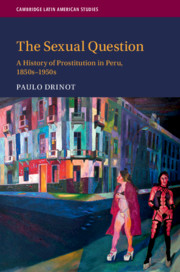Book contents
- The Sexual Question
- Cambridge Latin American Studies
- The Sexual Question
- Copyright page
- Dedication
- Contents
- Figures*
- Maps
- Acknowledgments
- Introduction
- 1 Regulating Prostitution
- 2 Protecting Men
- 3 Policing Women
- 4 Medicalizing Sin
- 5 Combating Venereal Disease
- 6 Abolishing Vice
- Conclusion
- Bibliography
- Index
- Cambridge Latin American Studies
6 - Abolishing Vice
Published online by Cambridge University Press: 22 February 2020
- The Sexual Question
- Cambridge Latin American Studies
- The Sexual Question
- Copyright page
- Dedication
- Contents
- Figures*
- Maps
- Acknowledgments
- Introduction
- 1 Regulating Prostitution
- 2 Protecting Men
- 3 Policing Women
- 4 Medicalizing Sin
- 5 Combating Venereal Disease
- 6 Abolishing Vice
- Conclusion
- Bibliography
- Index
- Cambridge Latin American Studies
Summary
This chapter examines the process that led to the closure of the barrio rojo in 1956. In a first section, it considers how the establishment of the barrio rojo coincided with an increasingly widely held negative view of regulation, which reflected the growing influence of abolitionism in the medical community and the public sphere, but it was also fed by the perception that the barrio rojo was a place of criminality and epidemiological threat. The chapter then examines the history of abolitionism in Peru, focusing on the establishment of the Comité Abolicionista Peruano and the activities that its members, a mix of medical doctors, lawyers, and feminists, promoted. In a third section, the chapter examines the campaigns led by publications such as ¡Ya! and Ultima Hora, in the late 1940s and early 1950s, to close down the red-light district. These campaigns, as a final section, drew on abolitionist arguments and contributed to the closure of the barrio rojo in 1956.
Keywords
- Type
- Chapter
- Information
- The Sexual QuestionA History of Prostitution in Peru, 1850s–1950s, pp. 232 - 281Publisher: Cambridge University PressPrint publication year: 2020



